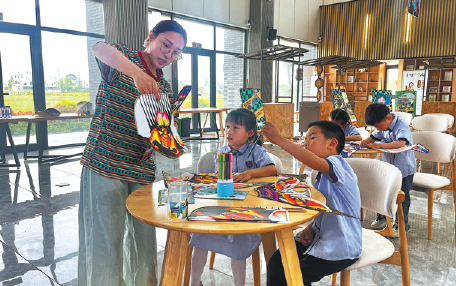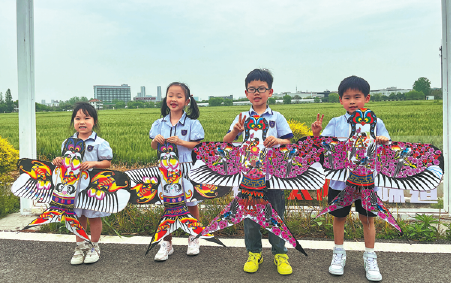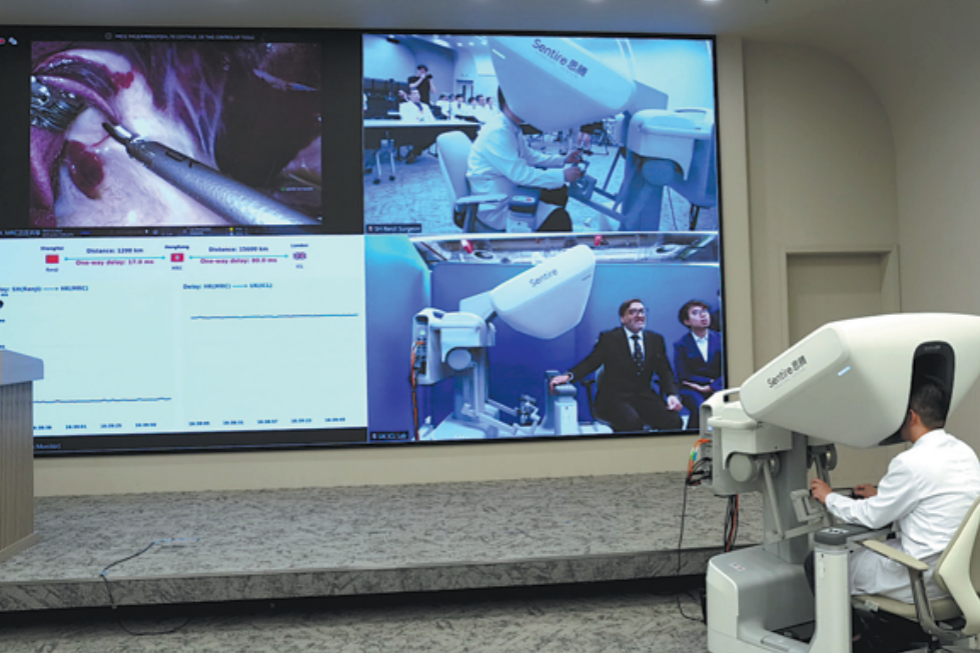Village offers a playful way to learn about nature

Kindergarten students ran wild with polychromatic kites in the vast paddy fields in Changqin village, in Jiaxing city, East China's Zhejiang province, in mid-April.
It was a school day, but the children were able to go out of the classroom to have a special learning experience in the open air.
One of them, six-year-old Xiao Rui, exuberantly introduces to his peers and teachers his handmade kite, on which he has painted a racing car zooming through a little forest.
"It feels great that I made something that can fly in the sky," Rui says with pride.
Right after the kite session, he and his classmates went on to explore what the countryside has to offer, such as sketching before the paddy field and making rice milk coffee in the village.
They are among a rising number of students who have sought experiences in the Yuliwendao program initiated by Xiangli Maike, a company focusing on integrating rural culture with travel.
"We've seen more than 10,000 participants every year," says Jiang Yefei, co-founder and general manager of the company, which has spearheaded rural study tourism initiatives since 2023.
The Yuliwendao program reconnects urban visitors, especially families, with agrarian traditions via hands-on experiences like rice cake crafting, rice milk coffee workshops, and mud-fishing in paddy fields. "Our philosophy is from knowledge to nourishment — learning through doing," explains Jiang, noting how activities subtly embed lessons about crop cycles and cultural, social, and economic practices related to the production and consumption of food.
When Jiang's team first surveyed Changqin village, they found vacant houses and minimal infrastructure. Through government collaboration, they transformed derelict spaces into immersive learning environments, including a re-purposed pigsty being turned into a ceramics studio, while idle farmland now hosts more than 10 study programs.
Their approach prioritizes light-touch education, avoiding classroom-style lectures in favor of kinetic learning.
"For instance, children grind rice into paste while our tour guides explain grain cultivation, bridging urban-rural knowledge gaps," Jiang says.
Jiang left his corporate career in luxury hotels and real estate about three years ago to launch rural study tourism programs in Jiaxing's countryside, when he found the appealing pastoral charm of villages and the disconnections of urban residents with farming culture.
"Many children growing up in the cities don't know exactly how rice is produced step by step," notes Jiang, adding that rural areas are ideal to fill the void.
The designed experiences by his team immediately got the attention of family travelers and schools from neighboring areas.
"They have shown a strong interest," Jiang says.
"Some parents are not just satisfied with the knowledge their children picked up, but take pride in enjoying the works their children delivered, such as the rice milk coffee," he adds.
Additionally, a rising number of corporate clients have paid premium rates for his "forest bathing" and "rice paddy meditation" sessions, in collaboration with professionals.
"Adults need nature therapy as much as kids need education," Jiang notes.
To date, his business has seen 40 percent repeat visitation rate among the customers.
A kindergarten teacher, Wu Ruoyun based in Jiaxing, has witnessed firsthand the transformative power of the rising number of study tourism programs like Jiang's.
"In the classroom, we might be only able to show pictures of rice plants and talk about growth cycles," she explains.
Yet, watching her students wade into ankle-deep water to transplant seedlings and feel the mud between their toes, "that's when real understanding takes root", she says.
She notes remarkable changes in her students: The shy child who proudly displays mud-caked hands, the energetic boy who sits patiently weaving reeds into baskets, the entire class buzzing with questions after watching traditional fishing methods.
"These aren't just field trips," Wu emphasizes.
"They're bridges between urban and rural, young and old, modern education and traditional knowledge," she adds.
With the country's supportive rural vitalization and study tourism policies, Jiang is positive that more potential in his business is yet to be tapped.
So far, he plans to expand from day trips to 3-day camps, partnering with woodcraft masters and artists for integrated curricula.
"Study tourism isn't just for kids," he emphasizes.
"Adults crave reconnection with the nature and tradition too."


Today's Top News
- Digital countryside fueling reverse urbanization
- 'Sky Eye' helps unlock mysteries of the universe
- China offers LAC development dividend
- Future sectors to receive more play
- Nation sets its sights on export boost
- China to open its door to foreign investment wider






























